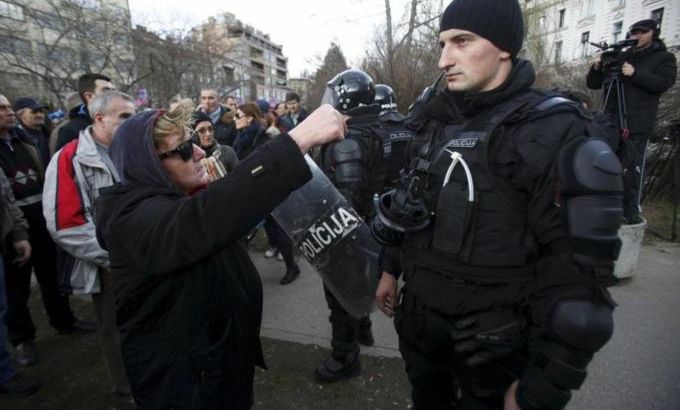Bosnia braces for more unrest after protests
At least 300 people injured since anti-government demonstrations over faltering economy began earlier this week.

Bosnia-Herzegovina braced for fresh protests amid warnings the country could face a “tsunami” of popular anger over its dire economy after days of riots left several hundred people injured.
Yesterday, demonstrators set fire to a section of the presidency building in capital Sarajevo and at least 200 people were injured in clashes with police. That brought the total to around 300 people injured since demonstrations began on Wednesday, the AFP news agency reported.
The interior minister warned on Friday that government inaction could spark more popular anger, saying authorities had to launch an “anti-graft tsunami.”
“If this does not happen, we will have a ‘citizens’ tsunami’,” Fahrudin Radoncic said in a TV interview.
The protests are the Balkan country’s worst unrest since the 1992-1995 war and reflect growing despair over the state of the economy in a nation where unemployment stands at 44 percent and where one in five lives below the poverty line.
The protesters are demanding the resignation of local and regional officials, whom they blame for two decades of political stalemate that has left the economy in dire straits.
Several senior officials in regional administrations in the southern town of Tuzla and the central town of Zenica resigned late on Friday under the pressure, local media reported.
Political stalemate
The protests first erupted in Tuzla, once the biggest industrial hub in Bosnia, where dozens of companies employing thousands of people were ruined after hasty privatisation.
|
|
| Bosnia braces for more protests |
Bosnia is among the poorest countries in Europe, with an average monthly salary of 420 euros.
Adding to its financial woes, the European Union said in December it would halve its financial aid over the nation’s lack of progress with reforms needed to join the bloc. Bosnia started high-level accession talks with the EU in mid-2012.
But a complex institutional structure in the country established after the end of the war – dividing power between its three ethnic communities, Serbs, Croats and Muslims – has led to an almost permanent political stalemate because of inter-ethnic dispute.